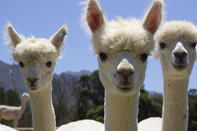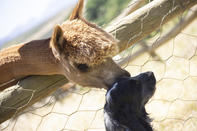Alpaca farming in South Africa is a young industry. Alpaca production started in the early 2000s when 60 animals were imported from Chile by Dr Gavin Lindhorst, an alpaca breeder from Inca Vale Alpacas near Wellington in the Western Cape.

Alpacas are kept as pets, effective guarding animals for sheep, for breeding stock but mostly for their high-quality fibre used for knitted and woven garments.
Alpacas have padded feet, an efficient digestive system and show high resistance to internal and external parasites. These characteristics, together with its insulative fibre suitable for luxury garments, give the farmed alpaca huge potential for commercial alpaca fleece production.
What is an Alpaca?
Alpacas (Vicugna pacos) are ruminant mammals related to the South American camel family and originate from the Andes Mountains in southern Peru, Bolivia, Ecuador and the northern part of Chile. Most of the 3 - 5 million alpacas in South America are found in Peru, in areas 3 000 m above sea level.
Alpacas are domesticated versions of vicuñas, South American ruminants (ruminants are animals with a four-part stomach) that also lived high in the Andes. Other members of this camelid family include the llama and the double-humped Bactrian camel native to Asia.
Although they do provide meat for people of their native countries, alpacas are mainly bred for their fleece while their cousins, the sturdier llamas, are bred to carry heavy loads. The long-legged alpaca grows to about 94 - 104 cm (at the shoulder) and can weigh between 55 and 85 kg. They live to up to 20 years and have a gestation period of 11.5 months.
Alpacas are alert, curious, calm and predictable and need the companionship of other alpacas. These gentle and intelligent animals are easy to handle and quickly become child- and dog-friendly pets.
Alpacas use sounds (e.g. a soft hum) and body language (e.g. head tilts and ear movements) to express themselves. They have excellent eyesight and hearing and may use a staccato-like alarm sound when they detect danger. When frightened they will move as a herd and may spit when scared or annoyed.
While the wild vicuñas grow in high and dry or low-lying wet areas, the domesticated alpacas are similarly adaptable and hardy but are mostly found in farmland and ‘free-range’ farming conditions.
Alpaca Production in the World
Peru, where most alpacas are found, have the best genetics and thriving fibre processing facilities. It is the world’s biggest producer of alpaca fleece and garments, supplying about 80% of the world’s alpaca products.
Canadian, American, New Zealand and Australian alpaca herds are growing and it is predicted that around the year 2020 America may be able to contribute up to 25% of the world’s alpaca production.
China is the biggest importer of alpaca fibre in the world.
Australia is very advanced in terms of alpaca genetics and breed improvement and is a good source of imported alpacas to South Africa.
Uses of Alpacas

While alpacas were domesticated animals who served as companions, sources of food and fibre to ancient tribes which lived in the Andes Mountains; alpacas in South Africa are mostly bred for their fibre. The very fine fibres are used to knit and weave garments varying from baby clothes to luxury suits.
The high-altitude South American Quechua people still eat alpaca meat, but the animal is not commercially used for meat or milk. The alpaca has very small teats - the size of pencil points - and it is very difficult to milk them by hand.
Alpaca males are also excellent guard animals and have been used with great success as flock guards in sheep flocks in South Africa. They have an acute herding instinct and will spit, hiss, bite and kick any predators that threaten ‘their’ flock.
Alpacas are also sold as breeding animals to improve the genetic material of other alpaca studs and make intelligent and mild-tempered pets.
By Marinda Louw
For bulk or Alpaca export enquiries please use the enquiry link below.